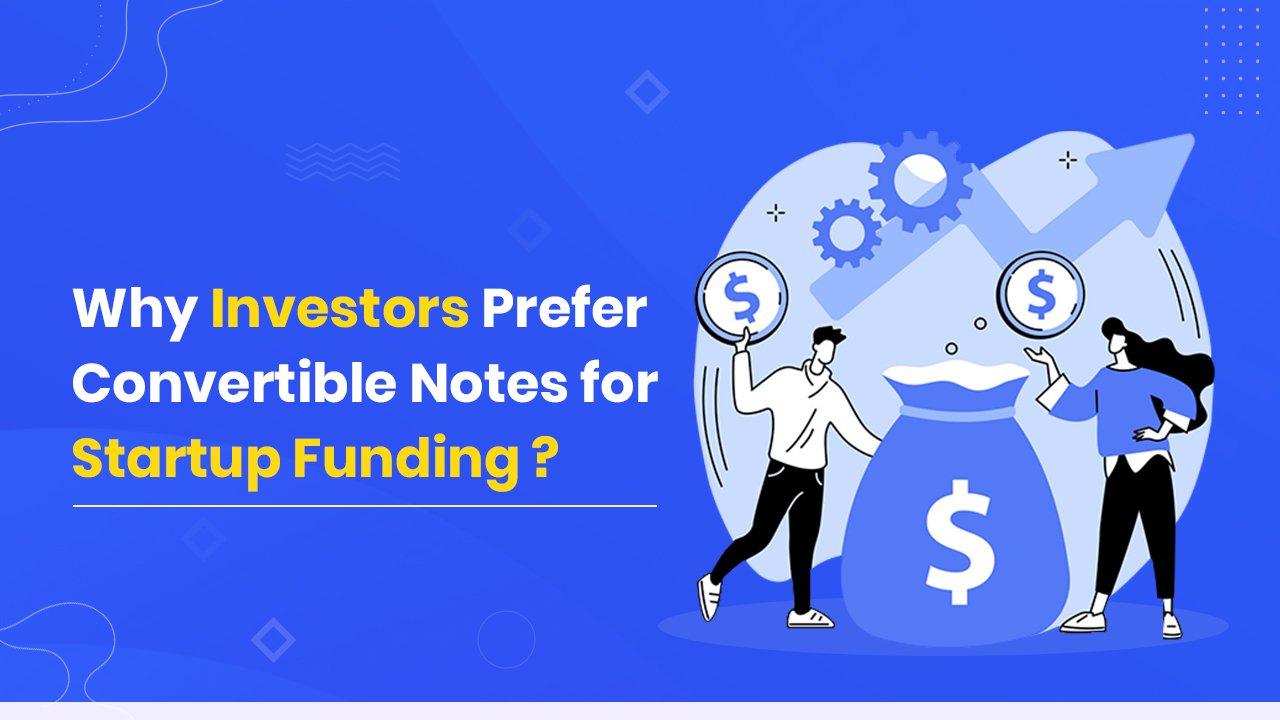Introduction
Funding is the most tasking task that the startups feel daunted by. Most early-stage companies want to raise capital without complicated negotiations and start production, while most investors for startups are looking for the best and highest returns.
In the world of startup financing, convertible notes, or convertible loans, or convertible promissory notes, or convertible debt, have emerged as a win-win situation for seed-stage companies. Investors of startups use convertible notes as it minimizes risk and secures future benefits. And for startups convertible notes are an easy road between equity and debt. A convertible note is a flexible short-term debt instrument that enables startups to gain the much necessary funds without committing to equity at the start. Convertible notes can be easily converted into equity at the later stage when the startup seeks funding in the next rounds.
Below is a comprehensive guide on convertible notes, how they work, and why they can be beneficial for investors who are looking to fund in high-potential startups.
What Is a Convertible Note?
A convertible note is a type of loan that an investor gives to a startup as an investment, but the repayment is not in the form of cash; it is automatically converted into equity (part ownership or shares in the company) during the subsequent funding round or if there is an exit event.
Key Features of Convertible Notes to Know

- Debt Instrument: Starts as a loan with a pre-agreed repayment structure.
- Conversion to Equity: the investor benefits with company shares.
- Discounted Share Price: The investors get a discount when the note converts as a conversion discount. It can be anywhere from up to 10% to 30%.
- Valuation Cap: It is the maximum valuation to which the note can covert to. It is an award for investing early.
- Interest Accrual: Convertible notes return interest that accrues with the principal invested. At the time of equity conversion, this interest rate results in an increase in the number of shares.
- Maturity Date: It is the date when the note expires, and the startup needs to pay back the interest and the principal amount.
The above characteristics make convertible notes a very viable option for investors for startups, especially the ones seeking early-stage funding.
How Do Convertible Notes Work?
It is actually a simple and straightforward process between the startup and investors.
- The startup issues a convertible note, and the investor lends capital in exchange.
- The startup uses the money to develop their product, expand operations, and grow.
- The next funding round: When the startup raises bigger funding demand to VCs, or angel investors or releases an IPO. Or an acquisition happens.
- The conversion feature is the key aspect of the note; unlike the traditional loans, there is no maturity date on the convertible note. When the conversion event is triggered the investor has the option to convert the loan into equity from a startup.
- The investor gets the equity at a lower cost than the others.
The convertible note contains all pertinent details such as principal amount, interest rate, maturity date, conversion terms, valuation cap, discounts, etc. If the note is not converted during the second funding round, the startup will repay the investor the full amount plus interest.
In simple words: The investors for startups give the money today and get a share of stock on a future date, or kind of an IOU. The debt can be converted in equity in two ways
- When the predefined milestone is met, such as getting a new funding or completing a financing round.
- Or when the company reaches a predetermined valuation
Why are Convertible Notes so Popular for Investors for Startups?

1. Discounted Shared Price:
During the conversion, the investors get the equity or the share prices at a discount. This type of delayed dilution of their equity gives the investor a chance to get more on their investment, as the company will have a higher valuation rather than later-stage investors.
2. Protection Against Overvaluation
Convertible notes come with valuation cap calculations. This feature ensures that the investors for startups benefit from the rapid growth. When the startup reaches heights at a skyrocketing speed, the investors get more ownership as they get the option to choose the valuation they invested in or the valuation for which they raised their next round of funding. This way they benefit from equity in the long run. Investors for startups can avoid valuing the startup too early.
3. Lower Risk as Compared to Direct Equity and Traditional Loan
Traditional startup investments set the valuation at the time of investment. Delayed valuation negotiations with convertible notes:
- Gives the investor the freedom to make the decision when the progress is clear.
- In case of startup failure, the note holder investor gets a priority in repayment over other equity holders.
This makes the convertible note investment a safety net for the investor.
4. Additional Equity with Interest Accumulation
Convertible note conditions might include an interest rate of up to 8%. which gets added to the principal amount. Therefore, during conversion scenarios, the investor gets the equity of the principal amount + interest accumulated, which is higher equity and ownership.
On the startup part, these interest rates are lower than the traditional rates, leaving room for the startups to take risks without putting up collateral or personal guarantees.
5. Simple Negotiation and Faster Investment
Traditional ways for investment can be sometimes tedious for both investors, and startup founders. Traditional equity deals need legal fees, immediate valuation, long negotiations on returns, agreements, diligence, voting agreements, and many more other items.
Convertible notes for investors for startups do not require due diligence and save on time and expense by closing deals quickly and raising quick capital. There are a few legal formalities, and startups can quickly go back to earning revenue, and investors see quick high returns for their money.
6. Flexibility in Investment Terms
The investors get to enter the startup early; they have the upper hand in negotiating favorable terms. Terms of the convertible notes can be negotiated to make them a highly adaptable funding instrument. The custom terms can be in the form of conversion timing, liquidation preference, and/or pro-rata rights that meet the needs of both parties.
7. Early Exit Potential in Case of Acquisition or IPO
When and if the startup is acquired before the note converts, the investor gets the preference to realize their gains even before the full funding. It can be in the form of high cash repayment or conversion into equity at a predetermined multiple.
Risks Of Convertible Notes for Investors for Startups

Convertible notes have many benefits for investors as well as startup founders. But they also can have some potential downsides, such as
- Uncertain valuation growth as there is a slight chance that the startup might not convert.
- Early dilution
- Default risks
- Limited influence of the investor
Conclusion
Convertible notes are a good way to get the most out of the funding for both investors and startups. They offer a unique balance of risk and reward. Both investors and startups have aligned growth and build a relationship of trust by mitigating early-stage uncertainties. Discounted equity, valuation protection, and flexibility make convertible notes a lucrative option for investors for startups. However, it is still necessary to evaluate the startup’s growth potential, the founding team’s vision, and their market competition. Convertible notes can be a powerful tool for maximizing the investment returns when used strategically.
Read Also: 7 Business Models That Can Transform Your Startup Idea






